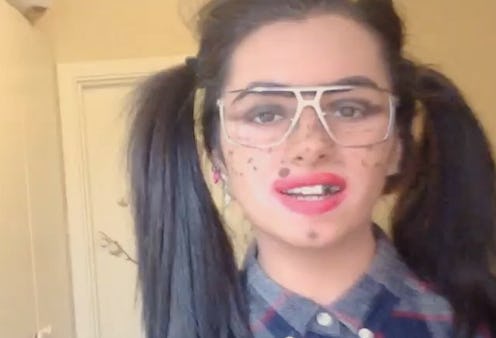Fashion
The Problem With The #DontJudgeChallenge

If you're an old person like me, you probably saw the hashtag #DontJudgeChallenge trending today, and thought to yourself, "Why are teens making themselves look ugly on Instagram?" The short answer is to combat body shaming and to show that people shouldn't be judged based on looks alone. But the #DontJudgeChallenge is more complicated than that, and although the intentions are good, a lot of these videos shame the very people who this meme is meant to empower.
It only takes watching a few of the #DontJudgeChallenge videos to understand the format, and when each is less than fifteen seconds long, it's easy to watch a lot of them. It starts with a close-up on a person who has done their makeup to appear "ugly." The go-to look is a painted-on unibrow and huge red dots that are supposed to look like zits, often topped off with a pair of oversized glasses and a frizzy hairdo. An upbeat song plays in the background, and the person who's been made up mugs for the camera, trying to look as conventionally unattractive as possible. (Pulling your chin close to your chest to create a double chin is a popular move.) The person then rubs in some cream, puts their hand up to the camera, and the frame goes dark.
When the hand's removed, the person is revealed to have entirely transformed (I think because of the cream they've just applied but not everyone does the cream thing, so who knows). Unibrow and zits are gone, as are the glasses. Hair is sleek and coiffed. That person in the video who you thought was ugly is beautiful now, and the viewer is meant to feel like a fool for judging the "ugly" person in the first place.
Part of the reason I find these videos so addictive and continue to scroll through the thousands of clips is because some of the transformations are pretty shocking, even when you know the makeup at the beginning is totally fake. What isn't immediately obvious is that the reveal at the end isn't just about removing the fake unibrow and drawn-on zits and glasses. It's also about doing a full-on glam face, and the dramatic difference between the "ugly" before and the "beautiful" after is usually because of makeup.
This is where the logic of #DontJudgeChallenge starts to fail, and where it stops being empowering and starts becoming counterproductive. This challenge isn't about embracing your flaws as they are. Instead, it at best pokes fun at and at worst shames those who do have these "unattractive" traits. The message being passed along is not that being "ugly" and having braces and glasses and acne are OK, but that underneath every "ugly" person is secretly a conventionally beautiful person just waiting to come out.
Other people have pointed out this disconnect between the meme's idealistic goal and more disheartening reality, arguing that these comic interpretations aren't fair to those who actually have unibrows or uncontrollable acne. The #DontJudgeChallege videos simply reinforce the fact that those characteristics make you unattractive and that you need heavy makeup to be thought of as beautiful at the end, to get rid of or hide those traits that make you appear ugly to others.
To show how misguided the #DontJudgeChallenge is, some people have started posting under #TheRealDontJudgeChallenge, in which they start with a full-face of makeup and cut to a makeup-free face, usually post-shower. It's really the anti-#DontJudgeChallenge, demonstrating that makeup isn't required to be beautiful and that being comfortable in your own skin is what's most important.
There is something refreshing about seeing people on social media make fun of themselves, but the #DontJudgeChallenge ultimately encourages conventionally attractive people to mock those who don't fit into that mold. And while it's also great to see teenagers thinking about body positivity and inclusivity, the way the #DontJudgeChallenge is designed shames those who don't fit into conventional beauty standards. There's no room for someone who naturally has a unibrow or cystic acne to look into the camera at the start at the video and "transform" at the end, and that's why this isn't a truly inclusive meme despite its best intentions. You shouldn't judge a book by its cover, but you also shouldn't require that people transform themselves to be beautiful.
Images: _dontjudgemechallenge, daniafzzz, riceball95, kaitlyn.knr/Instagram; SloFloAntonio/Facebook